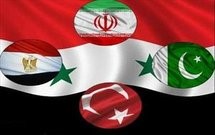 The interests of Turkey and Iran, otherwise geopolitical competitors, seem to converge on the recent ouster of former Egyptian President Mohammed Morsi. Both Ankara and Tehran have come out criticizing Egypt’s military for overthrowing the Morsi administration in the July 3 coup. Their reasons for doing so are very different, but what it comes down to is that without the Muslim Brotherhood-led government, both will have to re-evaluate a number of their objectives for the region.
The interests of Turkey and Iran, otherwise geopolitical competitors, seem to converge on the recent ouster of former Egyptian President Mohammed Morsi. Both Ankara and Tehran have come out criticizing Egypt’s military for overthrowing the Morsi administration in the July 3 coup. Their reasons for doing so are very different, but what it comes down to is that without the Muslim Brotherhood-led government, both will have to re-evaluate a number of their objectives for the region.
The Islamic Republic News Agency reported Thursday that the country’s foreign minister, Ali Akbar Salehi, will be visiting Turkey on Friday. Quoting Foreign Ministry spokesman Seyyed Abbas Aragchi, Iran’s official news agency said Salehi will hold discussions with Turkish officials on developments in Egypt, among other regional matters.
Despite their intense competition for influence in Iraq and Syria, Ankara and Tehran have maintained a working relationship and, in Egypt's case, the two non-Arab Muslim powers have been unhappy about Morsi's overthrow.
Given its struggles with its own military and history of coups, Turkey was bound to oppose the Egyptian military’s move. After all, it was only in the last few years that Turkish Prime Minister Recep Tayyip Erdogan's Justice and Development Party was able to establish civilian supremacy. Today, when the party is witnessing unprecedented protests against its nearly 11-year rule, it's not in its interests to see the Egyptian military remove the Muslim Brotherhood from power.
Not to mention the opponents of the Justice and Development Party have drawn parallels between it and the Muslim Brotherhood. Both are criticized for their undemocratic attitudes toward their respective opposition forces. There is also the fact that the Brotherhood is an Islamist movement and the Turkish governing party has Islamist roots.
Origins aside, the Turkish party is ideologically very different from the Brotherhood. In fact, many within the Brotherhood -- especially the younger generation -- idolize the post-Islamism of the Justice and Development Party. Erdogan's camp had hoped to use this reverence to help it eventually establish its influence in Egypt, the largest Arab state.
On the other hand, Iran is ideologically much closer to the Muslim Brotherhood. However, the Sunni-Shia sectarian divide severely limits Tehran's ability to expand its influence into Egypt. Knowing its limitations, Tehran had found utility in the Brotherhood elsewhere, namely to influence its main regional foe, the Saudis, who dislike the Brotherhood. Iran had also hoped to eventually use the Brotherhood as a tool against Israel, since the Brotherhood had stated its desire to revise the Camp David Accords. And there was a desire within the Islamic republic to use relations with Cairo to reach out to the Syrian branch of the Muslim Brotherhood in order to divide the rebel landscape in Syria.
With the fall of the Morsi government, neither Iran nor Turkey will be able to realize their objectives with regard to Egypt. This common loss does create the opportunity for the Turks and the Persians to discuss the more important and immediate matter of Syria. Neither side wishes to see jihadists emerge as the leaders of the Sunni opposition, thus there is ample room for cooperation.
Courtesy : Stratfor (www.stratfor.com)